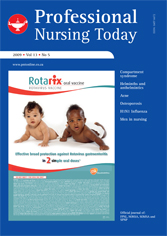Does breastfeeding prevent atopic disorders?
Keywords:
breastfeeding, atopic disorders
Abstract
Conflicting study results on the role of breast-milk feeding have been reported in the literature. These diverging results may be related to the complex interaction between breast milk, the intestinal milieu, and the immune system of both baby and mother, as well as the environment. Breast-milk feeding remains the gold standard of infant nutrition during infancy. Although its role in the prevention of atopic disorders in children is still not conclusive, there is evidence that it may protect some infants against eczema and that prolonged breastfeeding may afford protection against asthma in younger children. There is a lack of evidence that maternal dietary restrictions during pregnancy and lactation play a significant role in the prevention of atopic disease in infants with the possible exception of atopic eczema. Exclusive breastfeeding for at least 4-6 months should be promoted. Health care workers should refrain from prescribing unsubstantiated dietary regimens during pregnancy and lactation to mothers with a history of atopy in their children as such diets could be harmful to both the mother and her baby. Over the past few decades the incidence of atopic disorders such as atopic dermatitis, asthma and food allergies has increased among young children. A survey conducted a decade ago showed that 30-40% of children in Western societies suffer from atopic disorders uch as eczema, asthma or allergic rhinitis.1,2 Early exposure to different food proteins is most likely to be involved in the pathogenesis of allergy. Although Grulee and Sanford3 identified a significantly lower incidence of eczema in breastfed compared with cows'-milk-fed infants almost 70 years ago, the exact role of breast-milk feeding in atopic disorders is still not clear. Some studies reported a protective effect of breastfeeding against allergies and asthma4,5 while in others no protective effect was noted.6 Bergman et al.7 and Sears et al.8 on the other hand found an association between breastfeeding and the development of atopic eczema or asthma. These diverging study results may be due to the fact that not only is breast milk immunologically very complex, but also the interaction between breast-milk feeding, the intestinal milieu, and the immune system of both baby and mother, as well as the environment, is even more complex.9 There could also be genetic differences between patients which would influence whether breastfeeding protects against the development of allergies or sensitises the individual.10 Chung et al.11 feel that infection and psychosocial factors may also play a role.
Issue
Section
Midwifery
By submitting manuscripts to PNT, authors of original articles are assigning copyright to Medpharm Publications (Pty) Ltd. Authors may use their own work after publication without written permission, provided they acknowledge the original source. Individuals and academic institutions may freely copy and distribute articles published in PNT for educational and research purposes without obtaining permission.

